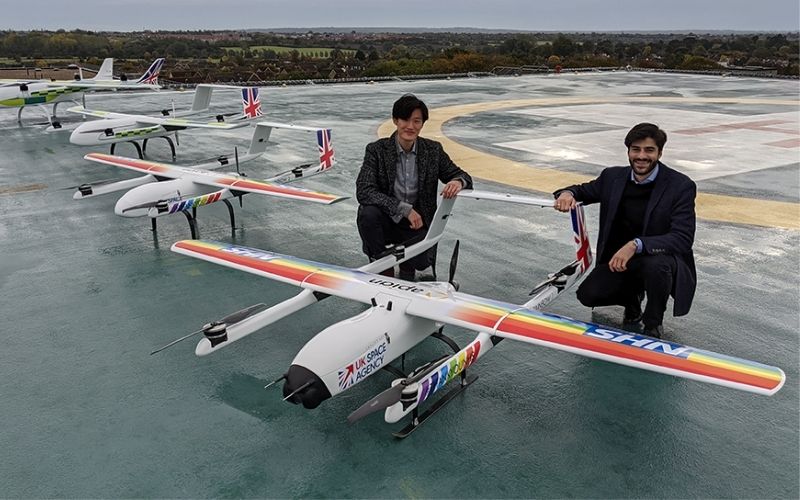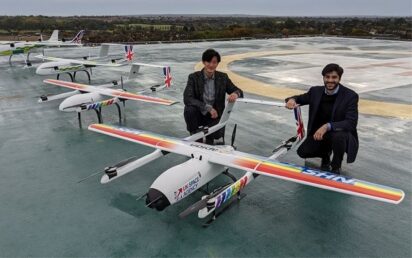The UK Space Agency has backed a healthcare drone start-up founded by NHS staff, to help in the response to COVID-19.
Apian, part of the NHS Clinical Entrepreneur Programme, aims to establish a network of secure air corridors for electric drones which can carry COVID-19 samples, test-kits and PPE.
These new air corridors are hoped to avoid courier call-out waiting times, free-up NHS staff, reduce physical contact and minimise the risk of secondary transmission of the virus.
The project will be based at Broomfield Hospital, part of Mid and South Essex NHS Foundation Trust and will be supported by the local Anglia Ruskin University as the academic partner. Befittingly, the hospital stands on a WW1 Royal Flying Corps Airfield.
Apian was founded by Hammad Jeilani and Christopher Law, trainee doctors at the Barts and The London as well as Mid and South Essex NHS Innovation Fellows. Apian is installing ‘dronepad’ infrastructure so its aircrafts can take-off from and land onto hospitals, laboratories and warehouses. In doing so, the startup is creating new standards and best practice guidelines; written by the NHS, for the NHS.
Apian will scale the work from their drone trials by creating the UK’s NHS Air Grid (NAG), a network of secure air corridors designed to safely, rapidly and effectively enable drone delivery across the NHS. Apian is creating these corridors by working closely with the Civil Aviation Authority, UK Space Agency and the emergency services.
Apian Founder Law explained: “We are confident that by setting up a medical drone delivery service, we’ll be able to fly samples to labs more regularly, reliably and quickly, improving patient health outcomes.”
The healthcare drone company is one of three new projects using space-enabled technologies and services to support the NHS in the ongoing battle against COVID-19.
The UK Space Agency is also backing a mobile app that will use satellite technology to provide access to community transport for people wishing to go to and from COVID care providers, and those looking to participate in community sport.
DriverNet will use AI to batch patients by their geolocation and encourage transport sharing, potentially reducing the 15 million missed NHS appointments each year.
NHS workers and patients will get a notification through text or on their app when shuttle services are available in their area.
Also being backed today is the delivery of a remote platform for Earth Observation learning. The collaboration, led by the University of Edinburgh, builds on the Earth Blox cloud-based software for harnessing planetary-scale satellite-intelligence.
The collaboration will provide distance learning support to students who would have been studying Earth Observation science.
The projects – set to receive £1.3m of funding – have been selected as part of a joint initiative between the UK Space Agency and the European Space Agency (ESA) which has already provided one round of funding in July, worth £1.1m, to companies developing space based solutions for issues created by COVID-19.
Initial funding went to three initiatives, including a drones company delivering test kits in Scotland and another project that used space data to support vulnerable people through a mobile application.
Emily Gravestock, Head of Applications Strategy at the UK Space Agency, said: Once again, the UK space industry has risen to the challenge. The variety of innovative solutions continues to impress me and I look forward to seeing how satellite applications built by UK industry can improve healthcare services, reduce carbon emissions and enhance education.


